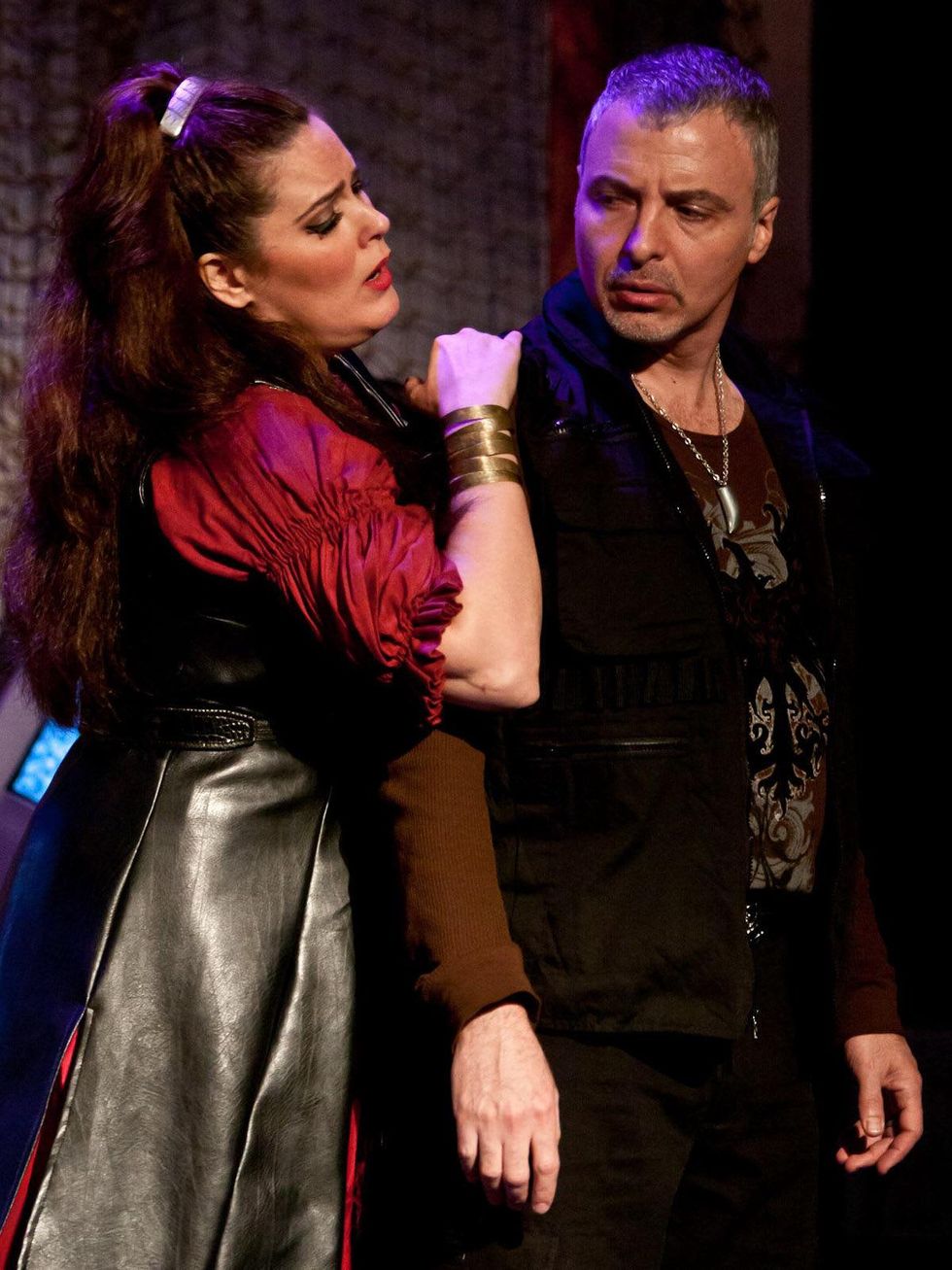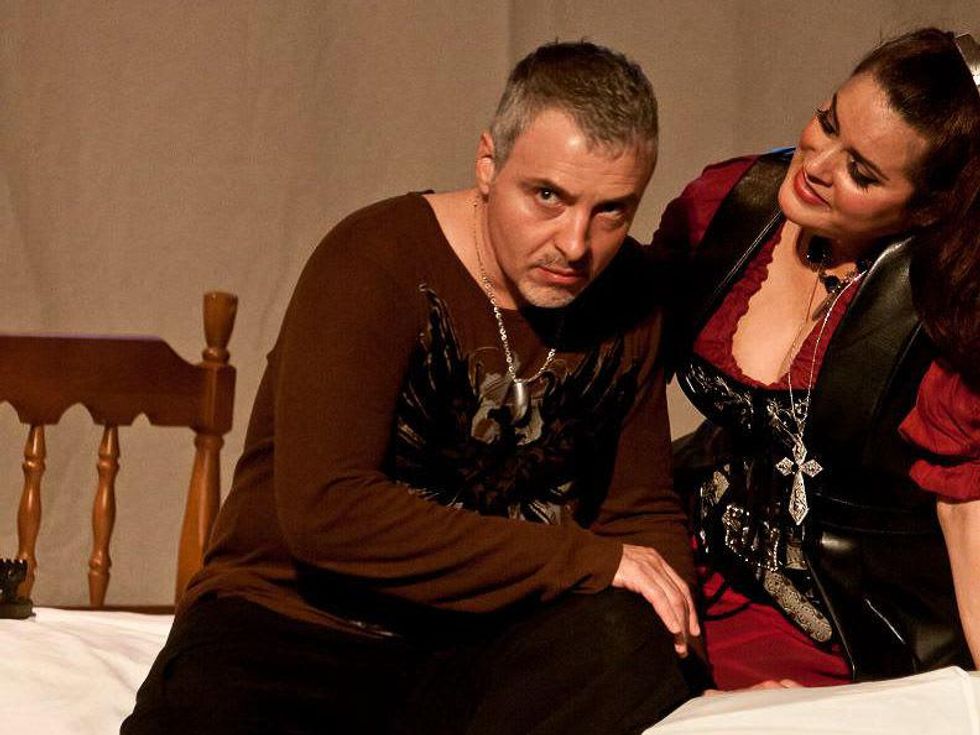The Review is In
Piss off women at your own risk: Opera in the Heights' Macbeth whips you like a dominatrix
Lessons learned from Shakespeare's Macbeth: Listening to women may be hazardous to your health. May cause visions, delusion, psychotic episodes and unwelcome ghosts to manifest at the most inconvenient circumstances.
Women may also disappear in your moment of need. Women are addictive. Women are persuasive. Women may ultimately cause death.
And men not born of women will kill you.
Take my précis with a grain of salt, please, and enjoy the somewhat inappropriate sexist humor. It's not intended to offend, but rather to illustrate a contrast between the original text and Verdi's setting, which expands the trio of witches to a chorus that manipulates man and woman alike. From the onset of the opera, Macbeth and Lady Macbeth have no hope in hell of escaping their tragic fate.
Opera in the Heights production of Verdi's Macbeth, running through Sunday at Lambert Hall, delivers what artistic director Enrique Carreón-Robledo pledged for the 2012-13 season. He sought to find a crux between honoring the Bard of Avon while, at the same time, diverging far from its historical context.
The production team transports this Macbeth from a regal milieu — otherwise belonging to the castle opera genre — to a post-apocalyptic Scottish wasteland where armed rebels in combat boots, leather vests, trendy graphic T-shirts, do rags, messenger bags and a combination of automatic shotguns and primitive battle axes and hatchets live unhappily ever after. For the time being.
It must have been a frosty environment. Many of the mortal characters sport beanies.
What you really receive is an in-your-face emotional whipping from a dominatrix in fishnets who toils with your musical guts.
The throng of pagan Wiccans, in striking opposition, however joyfully clothed in mid-century housewife attire and neon wigs, fume a nefarious affect with disturbing expressions and malevolent gestures. Yet their appearance develops to offer another interpretation: As an experimental cast of lab technicians who meld alchemy and science to drug the protagonists with the bacteria that ushers their fatal demise.
Considering the status of women at the time of Shakespeare, a modern clarification could serve as a word of caution: Do not piss off the female sex, keep women down at your own risk.
Although most productions that attempt to update Shakespeare are plagued with overstretching with flash trash, Opera in the Heights' version evinces what locals have admired about this small-sized company ever since Carreón-Robledo took over the reigns: A risky, daring, indefatigable, balls-to-the-wall performance that demands your attention and doesn't apologize for what it is.
You think you are handed opera on a vintage, gilded silver platter (something made in England circa 1750s), but what you really receive is an in-your-face emotional whipping from a dominatrix in fishnets who toils with your musical guts. You like it. And you want more.
Part of Opera in the Heights' prowess is the intimate concert hall. The closeness of the audience to the onstage action supports effective, intense eye-to-eye communication. The performers do not have the option to forget there are listeners in the audience and listeners don't have a choice but to be engaged.
Lucky for concert goers, this cast balanced vocal and thespian strength — for the most part.
Opera in the Heights shares an operatic experience suitable for anyone who wants to be moved.
Though the muscle tone of baritone Gustavo Ahualli and the piercing quality of soprano Rosa D'Imperio, both of whom were making their Opera in the Heights debut, were evenly matched as the fateful couple, D'Imperio erupted on stage with the commanding, dramatic presence of a sinister provocateur. While Ahualli's portrayal of Macbeth's psychosis triumphed during introverted moments, fiery, raw outbursts were somewhat contained, however colorful, especially given the production's mise-en-scène.
Bass Aaron Sorensen as Banco surprised with a rich, pounding lower tessitura. Jason Wickson, as Macduff, understood his role as a benevolent character who's responsible for the kingdom's absolution. This young tenor's delivery cut through thick and loud scoring such that a ray of impassioned sunshine foretold the corrupt couple's karma, and cleared the path for Nathan de Paz, as Malcolm, to reclaim his rightful place as nobility.
Whatever intonation or timing inconsistencies may have arisen during performance, in both the orchestra and choruses, they were easily awash by the commitment of the whole company to offer something new, fresh and innovative, while honoring the integrity of the spirit of the art form.
Where professional groups may excel in technical precision (though not always), Opera in the Heights shares an operatic experience suitable for anyone who wants to be moved.
Why else watch opera live?




